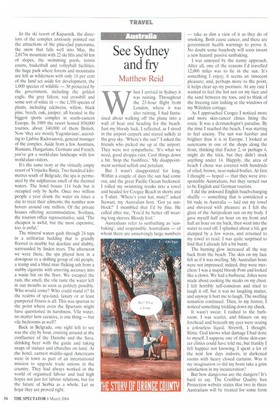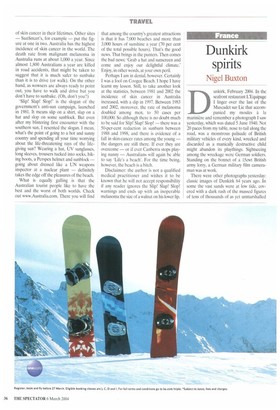See Sydney and fry
Matthew Reid
In the ski resort of Kapaonik, the directors of the complex anxiously pointed out the attractions of the pine-clad panorama, the snow that falls well into May, the 2,017m mountain with 22 ski lifts and 60 km of slopes, the swimming pools, tennis courts, basketball and volleyball facilities, the huge park where forests and mountains are left as wilderness with only 14 per cent of the land set aside for development, the 1,000 species of wildlife — 30 protected by the government, including the golden eagle, the grey falcon, red crossbill and some sort of white tit — the 1,350 species of plants, including edelweiss, willow, black pine, beech, oak, juniper, all located in the biggest sports complex in south-eastern Europe. In 1989 the resort hosted 850,000 tourists. about 340,000 of them British. Now 'they are mostly Yugoslavians', according to Ljubisa Radovanovic, general manager of the complex. Aside from a few Austrians, Russians, Hungarians, Germans and French, you've got a world-class landscape with few world-class visitors.
It's the same story at the virtually empty resort of Vrnjacka Banja. Two hundred kilometres south of Belgrade, the spa is permeated by the sulphurous smell of the thermal waters. The hotel boasts 114 beds but is occupied only by Serbs. Once two million people a year drank the water six times a day to treat their ailments; the number now hovers around one million. Of the private houses offering accommodation, Svetlana, the tourism office representative, said, 'The cheapest is awful, but the most expensive, too, is awful.'
The mineral waters gush through 24 taps in a utilitarian building that is grandly floored in marble but desolate and shabby, surrounded by linden trees. The afternoon we were there, the spa played host in a downpour to a shifting group of old people, a tramp and a blind man flicking ash from a stubby cigarette with unerring accuracy into a waste bin on the floor. We escaped the rain, the smell, the vile taste the water left in our mouths as soon as politely possible. Who would come? Who could stand it? In the realms of spa-land, luxury or at least pampered fitness is all. This was spartan to the point where even the Spartans might have questioned its harshness. Vile water, no matter how curative, is one thing — but vile bedrooms as well?
Back in Belgrade, one sight left to see was the city by boat, cruising around at the confluence of the Danube and the Sava, drinking beer with the guide and taking snaps of statues and churches on land. At the hotel, earnest middle-aged Americans were in town as part of an international mission to upgrade trade unions in the country. They had always worked in the world of organised labour and had high hopes not just for labour relations, but for the future of Serbia as a whole. Let us hope they are proved right.
Nvhen I arrived in Sydney it was raining. Throughout the 23-hour flight from London, where it was also raining, I had fantasised about walking off the plane into a wall of heat and heading for the beach. Just my bloody luck, I reflected, as I stood in the airport carpark and stared sulkily at the grey sky. 'Where's the sun?' I asked the friends who picked me up at the airport. They were not sympathetic. 'It's what we need, good droppa rain. Cool things down a bit. Stop the bushfires.' My disappointment seemed selfish and petulant.
But I wasn't disappointed for long. Within a couple of days the sun had come out, and the great Pacific Ocean beckoned. I rolled my swimming trunks into a towel and headed for Coogee Beach in shorts and a T-shirt. 'Where's your hat, mate?' asked Stewart, my Australian host, 'Got ya sunblock?' I mumbled that I'd be fine. I-le called after me. 'You'd be better off wearing long sleeves. Bloody fool.'
Australians refer to sunbathing as 'sunbaking', and responsible Australians — of whom there are unnervingly large numbers — take as dim a view of it as they do of smoking. Both cause cancer, and there are government health warnings to prove it. No doubt some busybody will soon invent a new hazard: passive sunbaking.
I was annoyed by the nanny approach. After all, one of the reasons I'd travelled 12,000 miles was to lie in the sun. It's something I enjoy; it seems an innocent pleasure; and, perhaps more to the point, it helps clear up my psoriasis. At any rate I wanted to feel the hot sun on my face and the sand between my toes, and to think of the freezing rain lashing at the windows of my Wiltshire cottage.
As I approached Coogee I noticed more and more skin-cancer clinics lining the route. It was a dermatologist's paradise. By the time I reached the beach, I was starting to feel uneasy. The sun was harsher and brighter than it is in Europe. I looked at suncreams in one of the shops along the front, thinking that Factor 2, or perhaps 4, might do the trick, but they didn't stock anything under 14. Happily, the area of beach I chose was covered with hundreds of oiled, brown, near-naked bodies, At first I thought — hoped — that they were irresponsible Australians, but they turned out to be English and German tourists.
I did the awkward English beach-changing shuffle — something that is considered a bit rude in Australia — laid out my towel and shivered with pleasure as I felt the glare of the Antipodean sun on my body. I gave myself half an hour on my front and half an hour on my back, then went into the water to cool off. I splashed about a bit, got dumped by a few waves, and returned to my towel to read. I was quite surprised to find that I already felt a bit burnt.
The burning glow increased all the way back from the beach. The skin on my face felt as if it was swelling. My Australian hosts were not impressed; indeed, they were merciless: I was a stupid bloody Pom and looked like a clown. We had a barbecue. Jokes were made about cooking the steaks on my chest. I felt horribly self-conscious and tried to laugh it off, but it was no laughing matter, and anyway it hurt me to laugh. The swelling sensation continued. Then, to my horror, I noticed something trickling down my cheek.
It wasn't sweat. I rushed to the bathroom. I was scarlet, and blisters on my forehead and beneath my eyes were oozing a colourless liquid. Strewth, I thought. Slime. God knows what damage I had done to myself. I suppose one of those skin-cancer clinics could have told me, but frankly I felt happier not knowing. I spent a lot of the next few days indoors, in darkened rooms with heavy closed curtains. Was it my imagination or did my hosts take a grim satisfaction in my incarceration?
But how dangerous are the dangers? It's hard to say. The Coolibar Quality Sun Protection website states that two in three Australians will be treated for some form of skin cancer in their lifetimes. Other sites — SunSmart's, for example — put the figure at one in two. Australia has the highest incidence of skin cancer in the world. The death rate from malignant melanoma in Australia runs at about 1,000 a year. Since almost 1,800 Australians a year are killed in road accidents, that might be taken to suggest that it is much safer to sunbake than it is to drive (or walk). On the other hand, as wowsers are always ready to point out, you have to walk and drive but you don't have to sunbake. (Oh, don't you?) 'Slip! Slap! Slop!' is the slogan of the government's anti-sun campaign, launched in 1981. It means slip on a shirt, slap on a hat and slop on some sunblock. But even after my blistering first encounter with the southern sun, I resented the slogan. I mean, what's the point of going to a hot and sunny country and spending all your time worrying about the life-threatening rays of the lifegiving sun? Wearing a hat, UV sunglasses, long sleeves, trousers tucked into socks, hiking boots, a Perspex helmet and sunblock — going about dressed like a UN weapons inspector at a nuclear plant — definitely takes the edge off the pleasures of the beach.
What is equally galling is that the Australian tourist people like to have the best and the worst of both worlds. Check out www.Australia.com. There you will find
that among the country's greatest attraction, is that it has 7,000 beaches and more than 3,000 hours of sunshine a year (70 per cent of the total possible hours). That's the good news. That brings in the punters. Then comes the bad news: 'Grab a hat and sunscreen and come and enjoy our delightful climate.' Enjoy, in other words, at your own peril.
Perhaps I am in denial, however. Certainly I was a fool on Coogee Beach. I hope I have learnt my lesson. Still, to take another look at the statistics, between 1981 and 2002 the incidence of skin cancer in Australia increased, with a dip in 1997. Between 1983 and 2002, moreover, the rate of melanoma doubled among men, to 50 cases per 100,000. So although there is no doubt much to be said for Slip! Slap! Slop! — there was a 50-per-cent reduction in sunburn between 1988 and 1998, and there is evidence of a fall in skin-cancer rates among the young — the dangers are still there. If ever they are overcome — or if ever Canberra stops playing nanny — Australians will again be able to say life's a beach'. For the time being, however, the beach is a bitch.
Disclaimer: the author is not a qualified medical practitioner and wishes it to be known that he will not accept responsibility if any reader ignores the Slip! Slap! Slop! warnings and ends up with an inoperable melanoma the size of a walnut on his lower lip.



















































































 Previous page
Previous page